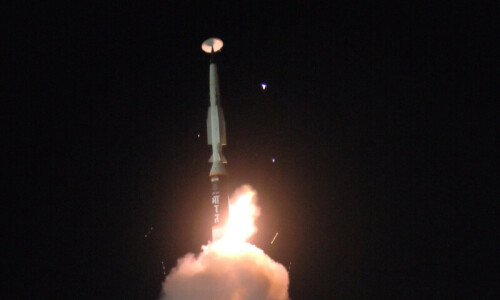KARACHI: Journalism is dying a ‘slow and agonising’ death and it is about time that we do something about it.
This was the voice that echoed the loudest in the auditorium of IBA, city campus, where veteran journalists gathered to discuss the relationship of democracy with journalism and free press, and the rising death toll of journalists in Pakistan.
“Media and Democracy: An Essential Partnership” was a lively panel discussion organised by the Centre of Excellence for Journalism (CEJ)-IBA. The conversation, moderated by Amber Rahim Shamsi, featured insights from Hamid Mir, Adil Jawad, and Lynne O’Donnell — all seasoned journalists.
They delved into the critical issue of press freedom, especially in the context of the alarming rise in journalist murders in the country’s smaller regions. The discussion had a good mixture of opinions from local and international media both.
CEJ-IBA panel discussion also underline partnership of media & democracy
“Social media’s access and the political manipulation has gotten the best of the press, and now journalism is dying in front of our eyes,” Ms Donnell said upon being asked if the journalism was dying.
Mr Mir opposed her statement by mentioning that he’s pretty optimistic about the future of journalism, but only if it was in sync with democracy and judiciary.
“Future of journalism can’t be analysed in isolation. It is interlinked with the political authorities, judiciary and the socio-economic systems. A strong democracy can’t survive without free press and free press can’t survive without a strong judiciary, and that is how we create a safe space for free journalism to exist,” Mr Mir said.
To back up his points, he mentioned Ahmed Farhad, a poet who was detained in late May and just got bail from the Azad Kashmir High Court this morning. He also brought up the issue of anchorperson Imran Riaz, who was released around the same time but was prevented from going on Haj.
“So I am optimistic about some courts, however I am aware that the judiciary is facing interference from the establishment,” he added.
Ms Donnell then took the conversation further by discussing how the pressure on journalists varied depending on the geographical requirements of their locations. She mentioned that in China, there was no such thing as press freedom.
“The commercial hold and political agendas have definitely left an impact on press freedom,” Ms Shamsi remarked.
Talking about misinformation, Ms Donnell quoted three incidents internationally, most recent being The New York Times reporting that so-called Islamic State-Khorasan militant group (IS-K) claimed responsibility for the Moscow Shopping Centre incident, whereas there was no responsibility claimed by the said organisation.
Delving deeper into the topic, Ms Shamsi asked Mr Jawad about his project focused on journalist safety. His team is reopening cases of murdered newsmen and conducting investigations to trace their killers.
“We are currently focused towards building a forensic system that would provide us with enough evidence from the crime scene because that is a problem. Apart from the pressure, the affected families have to stay quiet due to multiple factors. Systematic flaws also exist and we’re trying to eradicate them,” Mr Jawad said.
“There are no punishments because either forces are unwilling, or unequipped, and we’re trying to work on the second factor,” he added.
He also talked about how social media has given a voice to journalists from small towns, which is ground-breaking.
Mr Mir concluded the discussion by remarking that if the judiciary did not take accountability for the people losing their lives, then there was only one way, and that would be naming and shaming the perpetrators.
In his keynote speech, IBA Executive Director Dr S Akbar Zaidi laid emphasis on the importance of free media, calling it ‘a fundamental component of democracy’, adding: “Democracy requires a free and transparent media where journalists and reporters can speak the truth to those who hold power and public office”.
“All elected and unelected representatives of the people need to be held accountable for their actions; hence a free media is a prerequisite and essential component of democracy,” said Dr Zaidi, according to a press release issued after the event.
Lamenting the ‘stifled and muzzled’ state of media in Pakistan where journalists are not free to report what they see, facts, interpretations and opinions, Dr Zaidi stated: “While we continue the ritual of elections, the formal subsumption of democracy is a long way away. Unless the media is free, there can be no democracy in Pakistan. This is non-negotiable.”
Published in Dawn, June 15th, 2024













































Dear visitor, the comments section is undergoing an overhaul and will return soon.